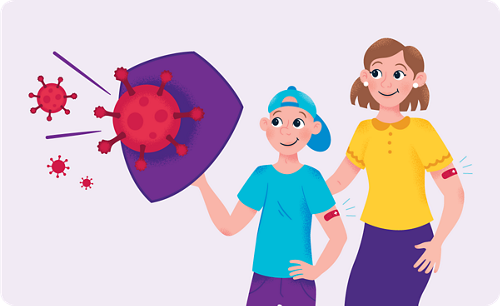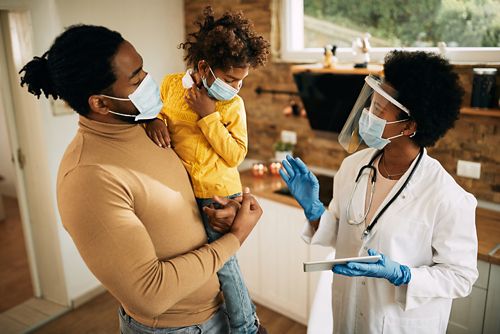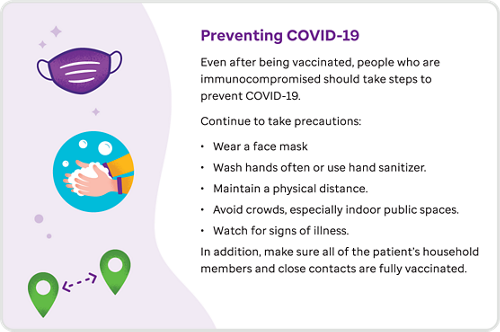Menu
Close
Back
Welcome to
Together is a new resource for anyone affected by pediatric cancer - patients and their parents, family members, and friends.
Learn MorePeople 6 months of age and older are now eligible to get COVID-19 vaccines and boosters.
COVID-19 vaccines are safe and recommended for anyone who is eligible.
Talk with your doctor if you have questions.
Patients who have weak immune systems or a high-risk medical condition such as cancer or sickle cell disease are more likely to have complications due to COVID-19. COVID-19 vaccination is especially important for these patients and those with underlying medical problems.
Because some patients with weak immune systems may not respond as well to the vaccine, family caregivers and household members should also get a COVID-19 vaccine. This provides an additional layer of protection for patients at higher risk.
Patients and family caregivers may be able to get a COVID-19 vaccine at their treatment center.
COVID-19 vaccines are also available in the community. Talk to your health care provider or visit the VaccineFinder website to find vaccine locations in your area.

A COVID-19 vaccine works to activate the immune system to protect against the coronavirus that causes COVID-19. You get the vaccine as an injection (shot) in the upper arm.
Three COVID-19 vaccines are available for use in the United States.
The CDC recommends that anyone who can receive one of the two mRNA vaccines (Pfizer-BioNTech or Moderna) do so. However, the Johnson & Johnson vaccine is available for those over 18 who cannot take an mRNA vaccine due to issues such as a severe allergy.
This recommendation is based on:
The Advisory Committee on Immunization Practices for the prevention of COVID-19 recommends receiving any vaccine—including the Johnson & Johnson vaccine—over not being vaccinated.
It takes at least 2 weeks to develop full immune protection after getting your final dose of COVID-19 vaccine. You are considered fully vaccinated if it has been at least 2 weeks since your second dose of the Pfizer-BioNTech or Moderna vaccine or 2 weeks after the 1 dose of the Johnson & Johnson vaccine.
Because protection after vaccination may decrease over time, you will also need a COVID-19 booster.
If you are immunocompromised (have a weak immune system), your doctor may recommend an additional dose of COVID-19 vaccine as part of your initial vaccination series.
A COVID-19 vaccine uses the body’s immune system to fight the coronavirus. The immune system is a network of special cells, tissues, and organs that protect the body from germs.
A vaccine helps your body develop immune responses to fight off infection without having to get sick first. When you get an infection, the immune system “remembers” that specific germ and is ready to defend against it the next time.
A vaccine must meet strict safety standards before it is available for use. After a vaccine is authorized, scientists will continue to study the COVID-19 vaccines to make sure that they are as safe and effective as possible.
Some people may have mild side effects after a COVID-19 vaccine. These are temporary symptoms that occur as your body begins making antibodies. They are part of a normal immune response.
Possible side effects include:

Talking to your child about the COVID-19 vaccine
Every child over age 5 in the United States is now eligible for a COVID-19 vaccine. These safe, effective vaccines are the best way to protect your child and your family from COVID-19. Your child may have questions about the vaccine and why they need it. This information can help you talk to your child about the COVID-19 vaccine.
Some people may have more noticeable symptoms after a second vaccine dose. Side effects from the vaccine should go away within a couple of days. Most people can continue their daily activities. Ibuprofen (Advil®) or acetaminophen (Tylenol®) may help relieve some of the symptoms.
Less common side effects, including severe allergic reactions, blood clots, and heart problems have occurred. However, these events are very rare. The risk of medical problems due to COVID-19 far outweigh the risks of getting a vaccine.
Tell your vaccine provider if you have a history of allergic reactions or have an allergy to any vaccine ingredient.

—
Reviewed: June 2022